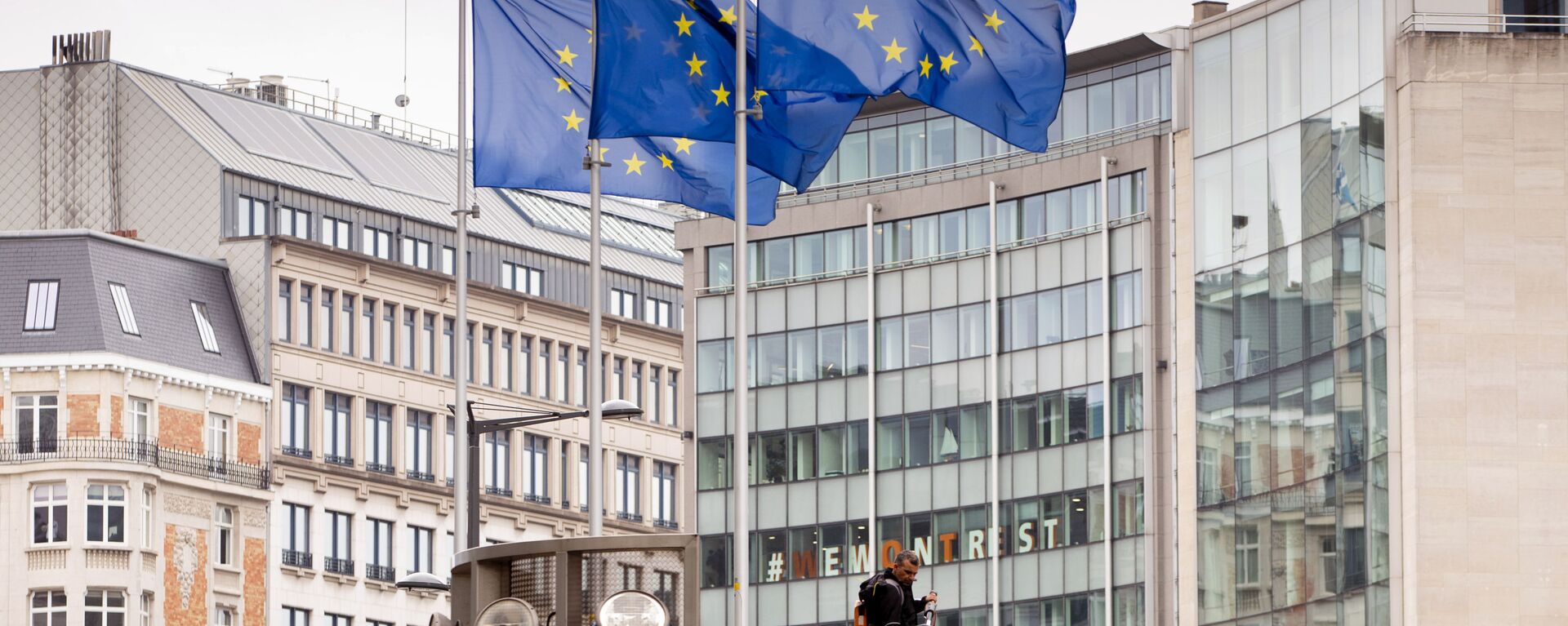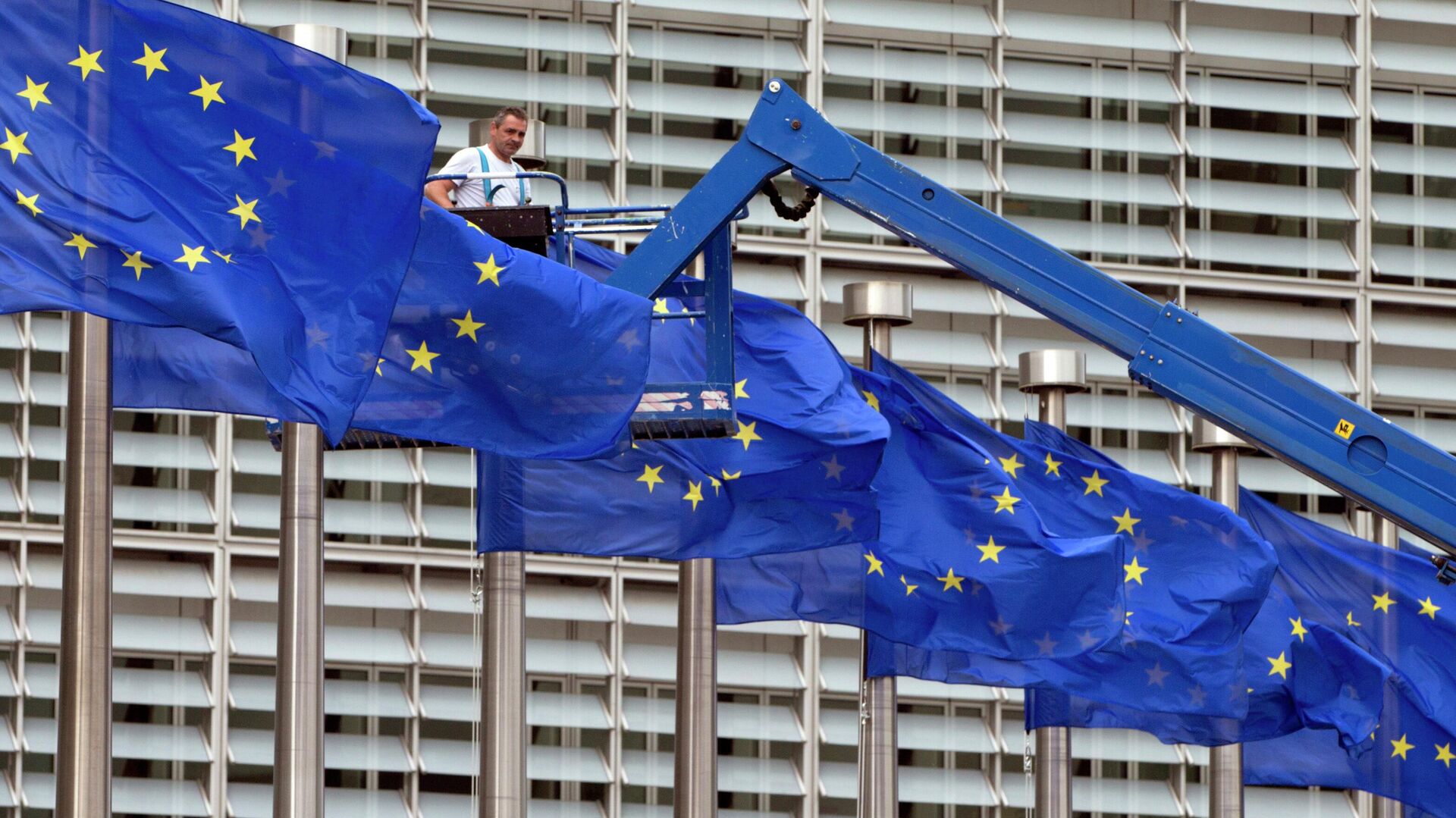https://sputnikglobe.com/20240217/eus-2024-economic-growth-forecasts-cut-as-blocs-big-guns-hit-recession-1116841060.html
EU's 2024 Economic Growth Forecasts Cut as Bloc's Big Guns Hit Recession
EU's 2024 Economic Growth Forecasts Cut as Bloc's Big Guns Hit Recession
Sputnik International
The 27-member bloc predicts marginal growth of less than one percent this year, raising concerns about potential economic challenges aggravated by risk factors like inflation, escalating geopolitical tensions in the Middle East, rising wages, strikes and cuts to energy subsidy programs.
2024-02-17T13:22+0000
2024-02-17T13:22+0000
2024-02-17T13:22+0000
world
european union (eu)
sputnik
european commission
east
russia
germany
paolo gentiloni
europe
business
https://cdn1.img.sputnikglobe.com/img/07e6/06/03/1095961953_0:0:3133:1762_1920x0_80_0_0_620632a3e3f7ba87b9eb41fda1482ef7.jpg
The European Union (EU) has cut its economic growth forecast in the face of multiple domestic and foreign crises.The latest Winter Economic Forecast by the unelected European Commission adjusted the outlook downwards to 0.9 percent this year from the expected 1.3 percent.The Eurozone, the group of countries which use the euro currency, has seen similar downgrades, with economists now projecting a growth rate of 0.8 percent rather than 1.2 percent.Concerns linger that the EU’s economy might encounter more obstacles than previously thought amid the Middle East conflicts and the cuts to national energy subsidies as part of the bloc's war on farmers, now protesting across mainland Europe.Paolo Gentiloni, the European Commissioner for Economy said the past year had been “extremely challenging” marred by a “confluence of factors.” But he was was hopeful that the EU would slowly make a comeback this year, driven by factors like gradual price increases, an uptick in real wages, and a robust labor market.Although the 27-member union managed to avoid a continent-wide recession by the end of 2023, its economic growth has been lacklustre, and economic powerhouse Germany has fallen into negative growth.Energy prices in Europe have soared since 2021 as a result of sanctions on Russia following the launch of its special military operation in Ukraine in February 2022.Despite the European Central Bank's (ECB) interventions, inflation is forecast to keep rising in Germany and the EU. Inflationary pressure in Europe arises from not just surging energy prices but also from increased costs across non-energy sectors. Europe continues to face challenges as its working-age population is projected to decline. Businesses are holding onto their employees, raising wages and potentially driving up wages while cutting productivity. Companies complain that red tape is hampering their competitiveness.Eight of the Eurozone's 20 members fell into recession in the past year. Their prospects remain grim year, a growth rates remain restrained, especially in the bloc's three major economies — Germany, France, and Italy. Former EU member the UK also dipped into recession in the last quarter of 2023 as its gross domestic product (GDP) fell by 0.3 percent thanks to reduced consumer spending during the cost-of-living crisis.
https://sputnikglobe.com/20221006/prospects-of-recession-in-eu-depend-on-blocs-management-of-energy-crisis---eu-commission-1101586791.html
east
russia
germany
Sputnik International
feedback@sputniknews.com
+74956456601
MIA „Rossiya Segodnya“
2024
Chimauchem Nwosu
https://cdn1.img.sputnikglobe.com/img/07e7/09/01/1113046371_0:99:1536:1635_100x100_80_0_0_9c5c627283eca931c39fe4852bbb301c.jpg
Chimauchem Nwosu
https://cdn1.img.sputnikglobe.com/img/07e7/09/01/1113046371_0:99:1536:1635_100x100_80_0_0_9c5c627283eca931c39fe4852bbb301c.jpg
News
en_EN
Sputnik International
feedback@sputniknews.com
+74956456601
MIA „Rossiya Segodnya“
Sputnik International
feedback@sputniknews.com
+74956456601
MIA „Rossiya Segodnya“
Chimauchem Nwosu
https://cdn1.img.sputnikglobe.com/img/07e7/09/01/1113046371_0:99:1536:1635_100x100_80_0_0_9c5c627283eca931c39fe4852bbb301c.jpg
european union, eu economic performance, winter economic forecast, european commission, eurozone, economists, paolo gentiloni, middle east conflicts, eu's energy support initiatives, eu recession, energy prices in the eu, sanctions against russia, germany inflation, eu inflation, european central bank, ecb, eu's working-age population, labor market constraints, eu bureaucracy, uk recession, gross domestic product, gdp, consumer expenditures, living costs, cost of living crisis.
european union, eu economic performance, winter economic forecast, european commission, eurozone, economists, paolo gentiloni, middle east conflicts, eu's energy support initiatives, eu recession, energy prices in the eu, sanctions against russia, germany inflation, eu inflation, european central bank, ecb, eu's working-age population, labor market constraints, eu bureaucracy, uk recession, gross domestic product, gdp, consumer expenditures, living costs, cost of living crisis.
EU's 2024 Economic Growth Forecasts Cut as Bloc's Big Guns Hit Recession
The 27-member bloc predicts marginal growth of less than one percent this year, raising concerns about potential economic challenges aggravated by risk factors like inflation, escalating geopolitical tensions in the Middle East, rising wages, strikes and cuts to energy subsidy programs.
The European Union (EU) has cut its economic growth forecast in the face of multiple domestic and foreign crises.
The latest Winter Economic Forecast by the unelected European Commission adjusted the outlook downwards to 0.9 percent this year from the expected 1.3 percent.
The Eurozone, the group of countries which use the euro currency, has seen similar downgrades, with economists now projecting a growth rate of 0.8 percent rather than 1.2 percent.
Concerns linger that the EU’s economy might encounter more obstacles than previously thought amid the Middle East conflicts and the cuts to national energy subsidies as part of the
bloc's war on farmers, now protesting across mainland Europe.

6 October 2022, 21:26 GMT
Paolo Gentiloni, the European Commissioner for Economy said the past year had been “extremely challenging” marred by a “confluence of factors.”
But he was was hopeful that the EU would slowly make a comeback this year, driven by factors like gradual price increases, an uptick in real wages, and a robust labor market.
Although the 27-member union managed to avoid a continent-wide recession by the end of 2023, its economic growth has been lacklustre, and economic powerhouse Germany has fallen into negative growth.
Energy prices in Europe have soared since 2021 as a result of sanctions on Russia following the launch of its special military operation in Ukraine in February 2022.
"At the Trento Economics Forum [in May 2023], EU Commissioner Paolo Gentiloni said: 'If Germany does not grow, this is not good news for Europe. Italian manufacturing is closely linked to German manufacturing, and therefore, the situation in Germany can also affect Italy. This is the reality," Paolo Raffone, a strategic analyst and director of the CIPI Foundation in Brussels, told Sputnik.
Despite the European Central Bank's (ECB) interventions, inflation is forecast to keep rising in Germany and the EU.
Inflationary pressure in Europe arises from not just surging energy prices but also from increased costs across non-energy sectors.
Europe continues to face challenges as its working-age population is projected to decline. Businesses are holding onto their employees, raising wages and potentially driving up wages while cutting productivity. Companies complain that red tape is hampering their competitiveness.
Eight of the Eurozone's 20 members fell into recession in the past year. Their prospects remain grim year, a growth rates remain restrained, especially in the bloc's three major economies — Germany, France, and Italy. Former EU member the
UK also dipped into recession in the last quarter of 2023 as its gross domestic product (GDP) fell by 0.3 percent thanks to reduced consumer spending during the cost-of-living crisis.




